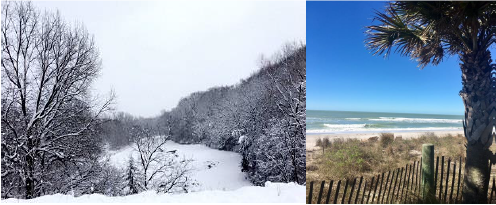Allison Behne
Have you ever noticed a common discontent regarding the weather? We generally find the weather too cold, hot, windy, rainy, dry, snowy … and the list goes on. Despite the occasional perfect day, we tend to wish for the weather that we don’t have.
Last week my family experienced both ends of the weather spectrum. On Wednesday, my children had a snow day from school in Iowa, and on Friday they were in 60-degree weather on a beach in Florida. While my husband and I definitely preferred the Florida weather, I noticed my children were equally happy in both places. In Iowa, the beautiful snow was perfect for snowball fights, sledding, and building snow forts. In Florida’s warm weather, they swam, collected shells, and built sand castles on the beach. They were perfectly satisfied in Iowa’s snow and Florida’s sun.

However, I noticed that adults generally reacted to the weather quite differently from my children. In Iowa, adults were tired of the cold, snowy weather, which meant bundling up to leave the house, shoveling driveways, clearing off cars, and clearing tracked in sand and snow off the floor. In Iowa, adults yearned for warmer weather—and anything above 32 degrees would help. In Florida, many adults were unhappy that the temperature had dropped to 60 degrees, which was the lowest they had experienced for a while. Floridians weren’t happy about putting on pants, closed-toed shoes, and even coats and scarves. What we do and don’t enjoy in life, including the weather, is related to our perspective—and children and adults often have wildly different perspectives on life.
This reminds me of the “grass is greener” mindset to which teachers can succumb if we aren’t careful. All the different variables that impact our teaching can sometimes be overwhelming and frustrating:
- Physical size of classroom
- Number of students
- Level of parent involvement
- Socio-economic status
- School funds
- Language barriers
- Behavior challenges
- Academic performance
These variables, and many more, affect our teaching decisions daily. If we aren’t careful, they can create a negative attitude that keeps us from opening our minds to new initiatives, ideas, and standards. We can find ourselves thinking, or even saying, “This won’t work in my school or class, because …”
High expectations and a positive perspective can keep us from going down this path. Yes, all kinds of variables can influence our classroom make-up, but we are trained to deal with those variables. Sometimes when the grass looks greener in another classroom, it’s just because that classroom has a different type of grass. If we embrace our current reality and teach to the unique environment for which we are responsible, we will start to discover and appreciate the irreplaceable benefits of our own setting. And maybe, as we water our own grass, we will find it to be just as green and healthy as everyone else’s.
News from The Daily CAFE
 Activities and Lessons . . .
Activities and Lessons . . .
Quickly Assess Learning with a Parking Lot*
This idea helps us quickly check student knowledge of a concept.
 Classroom Tips and Resources . . .
Classroom Tips and Resources . . .
Three Benefits of Writing in the Math Classroom and How to Get Started *
Use strategy and purpose to implement writing during math.
 Timely Ideas . . .
Timely Ideas . . .
Managing Transitions with Chimes
Instead of our voices, we use small chimes to indicate that a round of Daily 5 has ended.
 Focus on Health . . .
Focus on Health . . .
Laughter
Your special power to keep things in perspective.





